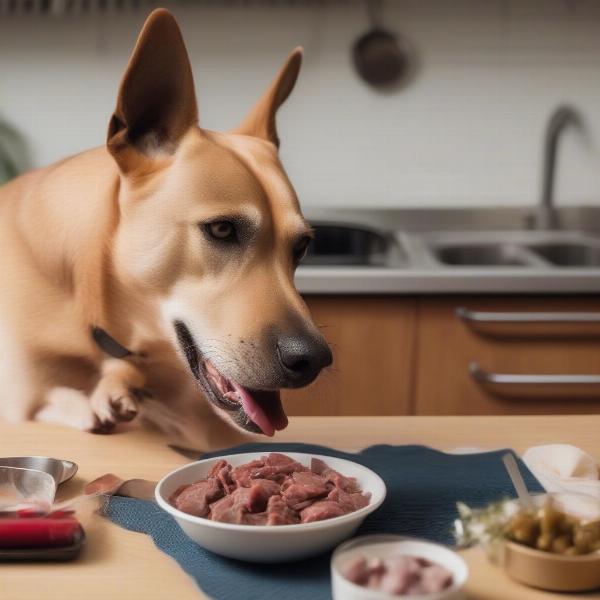Offal, also known as organ meats, can be a nutritious and affordable addition to your dog’s diet. Understanding the benefits, risks, and proper preparation of offal is key to ensuring your dog receives the optimal nutritional value without any adverse effects. This guide will explore everything you need to know about incorporating offal into your dog’s meals, from choosing the right types to safe handling and preparation techniques.
Choosing the Right Offal for Your Dog
Not all organ meats are created equal. Some are more nutrient-dense than others, while some carry higher risks if not prepared correctly. Liver, for example, is packed with vitamins A and B, but too much can lead to vitamin A toxicity. Kidneys are a good source of vitamin B12 and iron, but should be fed in moderation due to their high phosphorus content. Other excellent choices include heart (rich in taurine and CoQ10), spleen (rich in iron and other minerals), and tripe (a good source of probiotics).
 Dog eating organ meats
Dog eating organ meats
Preparing Offal for Your Dog
Proper preparation is crucial for minimizing risks and maximizing the nutritional benefits of offal. Always source organ meats from reputable butchers or farms that prioritize animal welfare and hygiene. Raw feeding carries the risk of bacterial contamination, so thoroughly cooking offal is generally recommended. Lightly steaming or boiling until cooked through is a good method, as it helps preserve nutrients. Avoid overcooking, which can make the offal tough and less palatable.
Balancing Offal in Your Dog’s Diet
Offal should be fed as a supplement to a balanced diet, not as the main component. A good rule of thumb is the “10% rule” – offal should make up no more than 10% of your dog’s overall diet. Introduce new types of offal gradually to monitor for any digestive upset. It’s also important to consult with your veterinarian, especially if your dog has any pre-existing health conditions. They can help you determine the appropriate amount and types of offal to include in your dog’s diet.
Benefits of Feeding Offal to Your Dog
Including offal in your dog’s diet can provide a range of health benefits. It’s a natural source of essential vitamins and minerals often lacking in commercial dog food. The high protein content supports muscle growth and repair, while the unique blend of nutrients can boost your dog’s immune system and contribute to a healthy coat and skin. nature’s menu dog food often includes offal in their recipes.
Is Offal Safe for Puppies and Senior Dogs?
Puppies and senior dogs can benefit from offal, but it’s crucial to adjust the amount and type according to their specific needs. Puppies require higher levels of certain nutrients for growth, while senior dogs may have different dietary requirements due to age-related health conditions. Consult your veterinarian for personalized recommendations.
Common Concerns about Offal
Some pet owners express concerns about the safety and palatability of offal. While raw offal does carry a risk of bacterial contamination, proper cooking eliminates this risk. Regarding palatability, some dogs may be hesitant to try offal initially. Introducing it gradually and mixing it with their regular food can help them adjust to the new taste and texture.
Conclusion
Offal, when sourced and prepared correctly, can be a valuable addition to your dog’s diet. Offering a rich source of essential vitamins, minerals, and protein, it contributes to overall health and well-being. Remember to consult with your veterinarian to determine the appropriate amount and types of offal to include in your dog’s diet, ensuring they receive the optimal nutritional benefits safely. cheapest raw dog food uk might be a starting point to exploring options.
FAQ
- What types of offal are safe for dogs? Liver, kidney, heart, spleen, and tripe are generally safe and nutritious for dogs when fed in moderation and cooked properly.
- How much offal should I feed my dog? Offal should make up no more than 10% of your dog’s overall diet.
- Can I feed my dog raw offal? Raw feeding carries the risk of bacterial contamination, so cooking offal is generally recommended. how to cook beef kidney for dogs provides further details.
- What are the benefits of feeding offal to dogs? Offal is a rich source of essential vitamins, minerals, and protein, contributing to a healthy immune system, coat, skin, and muscle development.
- What if my dog doesn’t like the taste of offal? Try introducing it gradually and mixing it with their regular food to help them adjust to the new taste.
- Is offal safe for puppies and senior dogs? Yes, but adjust the amount and type according to their specific needs. Consult your veterinarian for guidance.
- Where can I source high-quality offal for my dog? Reputable butchers or farms that prioritize animal welfare and hygiene are good sources.
About ILM Dog
ILM Dog is your trusted international resource for all things dog-related. We offer expert advice on dog breeds, health, training, nutrition, grooming, and much more. From puppy care to senior dog support, we cover all aspects of canine companionship. Whether you’re a seasoned dog owner or just starting your journey, ILM Dog provides reliable information to help you provide the best possible care for your furry friend. Contact us at [email protected] or +44 20-3965-8624 for personalized guidance.